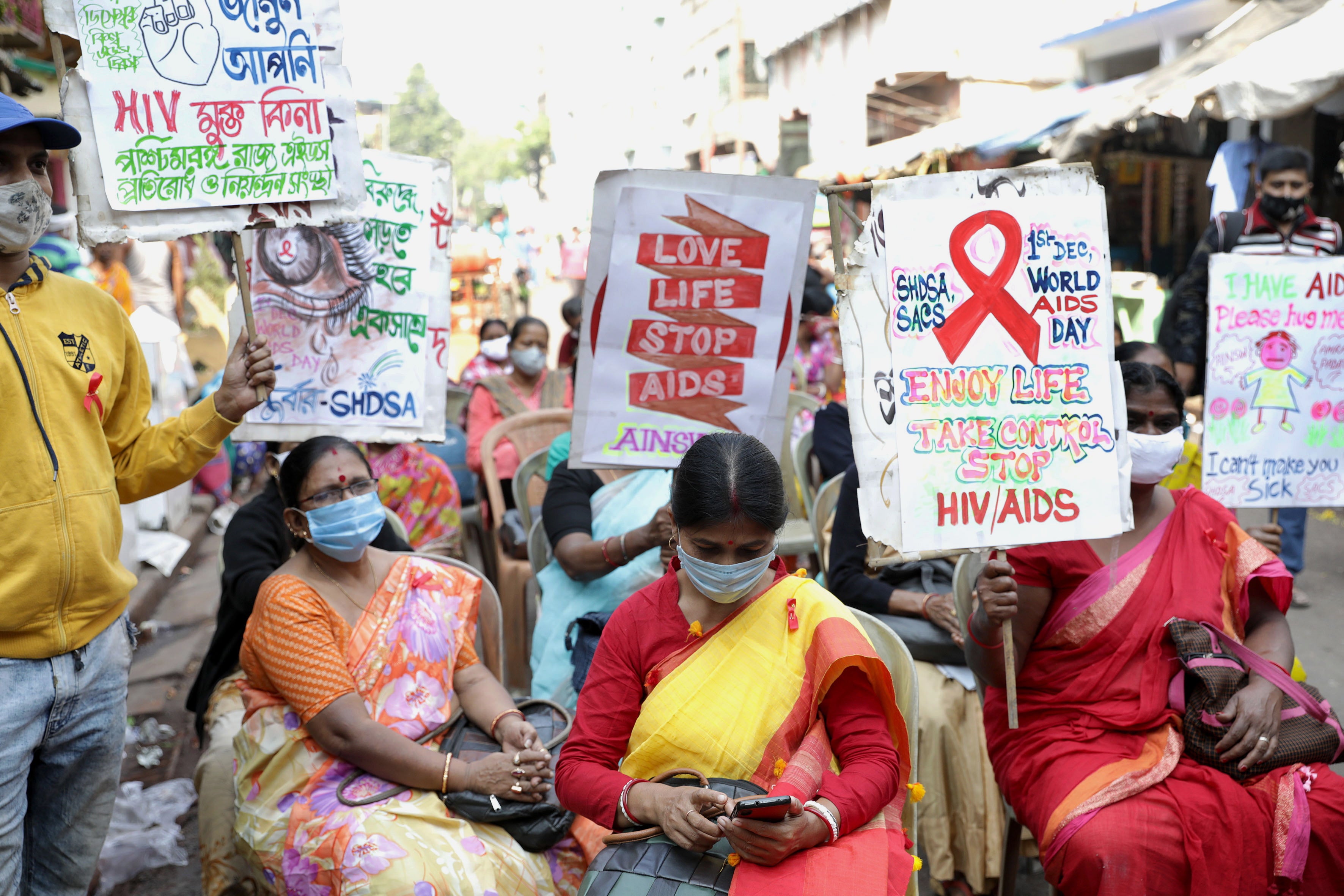Out of touch: Sex workers speak of poverty and anxiety during India’s long Covid months
In Delhi’s red light district, Namita Singh hears how workers have been affected by the pandemic in an industry that relies entirely on one thing – physical contact with strangers


Sex work took a major hit during the 2020 pandemic in India when its migrant clientele vanished after the government imposed a sudden lockdown – pushing sex workers into a debt crisis. While restrictions have eased, the anxiety about a business that thrives on physical contact remains.
Most brothels in the capital city of Delhi are poorly monitored, many without even a thermometer to check the body temperature of the people who visit them, and sex workers tell The Independent they are constantly exposed to the risk of infection.
“Some [sex workers] got so paranoid about contracting the infection that they started applying sanitiser all over their body after sex,” Kusum (who requested that she be identified only by her first name), president of the All India Network of Sex Workers (AINSW) says. Baths after clients leave are a luxury as water supply is irregular.
In March of 2020, India descended into chaos after the government seemingly shut the country down almost overnight to try and curb the rapidly climbing infection. Businesses stopped, public transport was halted, and gates of housing complexes were closed. It witnessed a mass exodus of migrant labourers leaving the big cities, with hastily-packed suitcases in hand and children in tow, to return home to smaller towns and villages after contractors stopped paying their daily wages.
For sex workers such as Meera, 40, social distancing doesn’t mean much. There’s more or less a freeze on her income and with whatever little work she is getting, she’s risking infection every day. “I have been sitting here on the GB [Garstin Bastion] Road since 11am in the morning. It has been five hours since. Not one client has come,” she says.
Meera was trafficked from Mumbai to Garstin Bastion Road — the biggest red-light district in Delhi — and pushed into the business of sex work at the age of 15. She says the current situation has forced her into anxiety and deprivation.
The story is a familiar one for Bhanu, 45, who has been waiting for clients. “Earlier, we used to get about four to five clients per day. But now, we don’t even get one. If we earned about Rs 500 [£5.03] per day, it is not even Rs 100 [£1.01], now.”
The core clientele for sex workers has traditionally been migrant workers, truck drivers and men who live away from their families. Given that this group is reeling with the economic effects of the pandemic induced lockdown, sex workers – themselves daily wage earners – are staring at months without business.
“A reduced client load means that we also are forced to take in those we would have otherwise declined,” explained Sania, 39, who is a home-based sex-worker in Delhi.
“All the sex workers are scared as the business is contact-based. They cannot function without minimum physical contact,” says Kusum.
While the government has announced relief packages for the poor, that include migrant workers, sex workers have largely been kept out of any social benefit schemes.
It was not until late September that some kind of aid in the form of dry ration reached sex workers when the Supreme Court directed all states to provide food to those identified by the National Aids Control Organisation and legal service authorities without the requirement of any proof of identity.
But food is only one part of the problem, Veena, 55, tells The Independent. “I have to take medicine for diabetes. There was no mode of public transportation available during the lockdown. I did not know how I would travel to the nearest government hospital to access my diabetes medicines.”
“You see, it is like a debt trap for us,” says Meera. “We were initially pushed in the business without consent. Then we worked in it to keep off the debt. But just when I thought I would be able to leave the business, a lockdown was called with few hours notice,” she laments.
“Now I have accumulated a loan of about Rs 20,000 in the last eight months. How am I expected to pay it off, with a reduced earning of Rs 100 a day?” She hasn’t been able to pay rent and has had to borrow money to meet her daily expenses.
Sex workers are unable to test whether a client is Covid-19 positive, explains Kusum. “Some brothels with enough income have a thermometer to check the temperature of the client but not all of us.” Typically an infrared thermometer costs Rs 900 and the price can go up to Rs 2000 or even more.
“It is, unfortunately only our responsibility to maintain any kind of cleanliness to keep our business going,” says Ria, 21, a transgender sex worker associated with AINSW. “We cannot push our clients to go home and take a bath. If we do, he might do it once, grudgingly but he would never come back for our services,” Ria says.
As a precaution, while some change bedsheets multiple times, others try bathing after every two clients, says Sania. “You see, sometimes the clients are more afraid than we are. Because they think that we come in direct contact with at least three to four clients a day, and therefore, are putting them at risk."
Sex workers in Delhi were not able to move their services online to keep the business going, explains Aarzoo Jolly, from NGO Kat-Katha, that works with sex workers and their children on the GB road. “This is also because most of their transactions are cash-based. Once it goes online, we assume that the transaction would also be digital. But the women barely eat hand to mouth. So you cannot expect them to have internet access.”
Digital divide in India
– About 4 per cent of the rural households and 23 per cent urban households in India have a computer
– 76 per cent of household do not have internet access
– In rural areas about 17.1 per cent of men are able to use internet, while only 8.5 per cent of rural women were able to do the same
– In urban areas about 43.5 per cent of males are able to use the internet compared to 30.1 per cent of women
Source: NSO data
Ms Jolly also thinks that it is important to talk about the mental health impact of the lockdown for these women. “Most of the women here have been through a lot of traumatic experiences, a lot of them have been trafficked, a lot of them have been sold from their husbands,” she says.
“So during the lockdown, when you are in your brothel, there is not much to do, so much uncertainty, so much fear, so much dependency on other people, most women started reliving their traumas. So, the hopelessness, fear, and insecurity hit their mental health,” Ms Jolly says.
Despite the hard life in this profession, Bhanu says she has no option to quit.
“You know, if I change the work, I will at the most be employed as a cleaner in a school or in someone’s house. But the person who will help me with the employment will not tell my boss about my last 25 years," she says.
“He will lie about my journey and deny me from owning up to my own past. With everything that I have endured, I think I am OK with going hungry on some nights but not with living a life of lie.”
The name of the sex workers have been changed with their consent to protect their privacy
Join our commenting forum
Join thought-provoking conversations, follow other Independent readers and see their replies
Comments


Bookmark popover
Removed from bookmarks